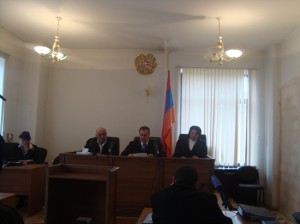The case against Avan Psychiatric Clinic is at the RA Court of Appeals
06:35, November 25, 2013 | News, Own news During May-July of 2013 within the frames of the monitoring at neuropsychiatric institutions HCA Vanadzor visited Avan Psychiatric Clinic. During one of the individual talks with the persons undergoing treatment at the institution, HCAV staff members met with Zhuleta Amarikyan, who told she did not have health issues and that she was placed at the psychiatric institution by her brother for mercenary purposes.
During May-July of 2013 within the frames of the monitoring at neuropsychiatric institutions HCA Vanadzor visited Avan Psychiatric Clinic. During one of the individual talks with the persons undergoing treatment at the institution, HCAV staff members met with Zhuleta Amarikyan, who told she did not have health issues and that she was placed at the psychiatric institution by her brother for mercenary purposes.
As it was previously informed, the Court of First Instance has satisfied the claim of Avan Psychiatric Clinic over Zhuleta Amarikyan’s case and had sent her for enforced treatment. Disagreeing with the ruling of the Court of First Instance Zh. Amarikyan was trying to appeal the aforementioned decision at the RA Court of Appeals via the help of her lawyer; however, the Court of Appeals did not take the appeal into proceedings justifying it with various reasons.
On November 20 of 2013, the RA Court of Civil Appeals finally took the appeal into trial.
During the court session, the court read one part of the appeal submitted to the Court by Zh. Amarikyan and her advocate Tigran Hayrapetyan.
Tigran Hayrapetyan mentioned that the Court failed to read the most crucial points of in his appeal, namely, the precedential decision of the European Court taken in similar situations and the articles on the application of enforced treatment as set forth in the European Convention on fundamental rights and freedoms.
Zhuleta Amarikyan was also present at the court hearing who informed the Court that she was unwilling to undergo inpatient treatment, besides, that she did not take in any medications during her stay at the psychiatric facility, since she was allergic to medications.
Zh. Amarikyan also noted in the court that she had been forcefully escorted by the police officials to Avan Psychiatric Clinic. With this much the Court put off the court session for December 3, 2013, when the latter will promulgate the judicial act.
After the court session was over the advocate noted that the Court did not refer to the most significant facts based on which it will adopt a ruling. The advocate also added that the Court had initially displayed a negligent and one-sided treatment.
This court hearing and all judicial proceedings give grounds to think that there is a discriminatory treatment, namely, stereotypes and stigma against persons with mental disabilities in the Republic of Armenia, including all domestic bodies.
